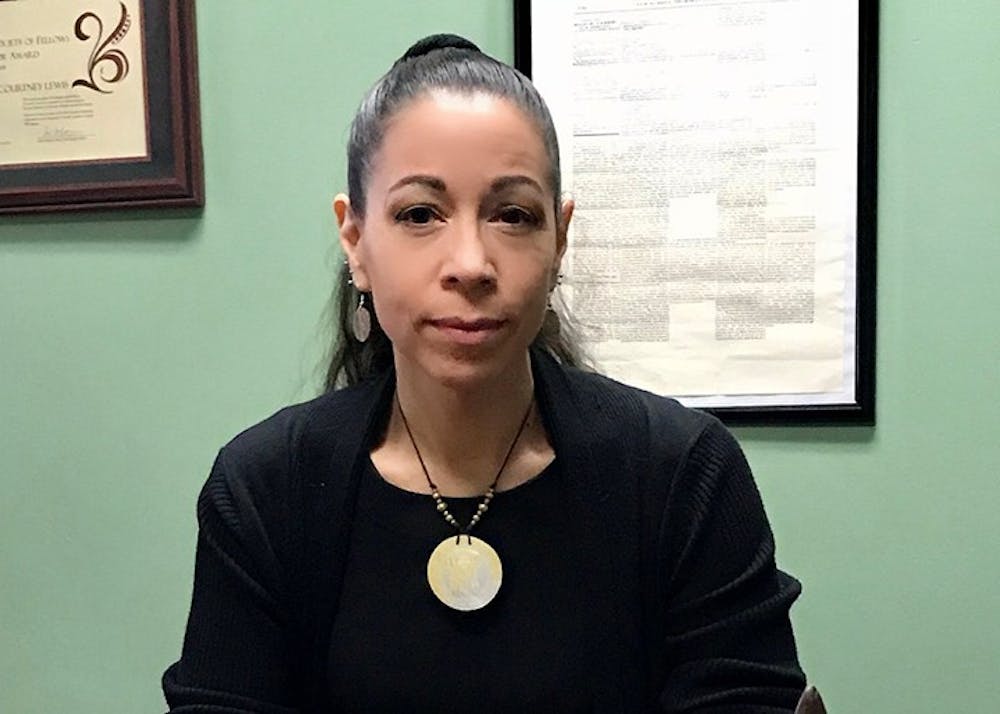When associate professor and Cherokee Nation citizen Courtney Lewis was young, she was inspired by her father, who was an advocate for American Indians.
"He was the first American Indian to get a Ph.D. in social work," said Lewis, who works in the anthropology department at USC. "He was also an activist on the national level for both the Cherokee Nation and American Indian justice. Largely, he helped raise the Indian Child Welfare Act, which is very important to American Indians and is being challenged right now."
In turn, Lewis has advocated for her fellow American Indians in the classroom and in her research.
Lewis is a citizen of the Cherokee Nation in Oklahoma and is presently working with the Eastern Band of Cherokee Indians. Her research is focused on American Indian small business owners and how American Indian entrepreneurs compare to non-native entrepreneurs.
“She is challenging some of the stereotypes that non-native people have about Native Americans while supporting Native American tribal sovereignty,” Rose Stremlau, who has taught with Lewis, said.
Stremlau, an assistant professor at Davidson College, said Lewis' research helps support American Indian sovereignty, which is "the right of native people to govern themselves," because the economy of an American Indian tribe can impact so many facets of life.
Lewis also partners with other professors at USC, such as Marcia Zug, to educate students.
“We've both taught each others' classes, so I've come and been a guest lecturer in her class, she's come and been a guest lecturer in my class. Our interest areas overlap a lot," Zug, a professor of law at USC, said. "Our worlds overlap a whole lot, and I love when we have an opportunity to exchange ideas and work together.”
Student-wise, the main goal is to encourage self-education and increased awareness for the problems facing American Indians today, Zug said. For her law students, Zug said she wants them to have enough knowledge of the laws that affect native people.
“[Our goal is] to help native people," Zug said. "Some of it is just knowing more. ... My goal in my classes is to make my students aware of these issues."
Lewis said many times she is the only voice to speak out against issues such as racism against American Indians. The way to elevate these problems is encouraging the "recruitment and retention of American Indian students," Lewis said.
“When you are the only American Indian in these situations, you will be expected to take on more work," Lewis said. "Because you will need to be mentoring people, you'll need to mentor your colleagues, you need to mentor students in a way that many people don't.”
Another pressing issue that is often overlooked is the police brutality faced by American Indians today, Lewis said. According to the Equal Justice Initiative, American Indians are more than three times as likely to be killed by police as whites.
“We've heard a lot about police brutality, as we should, over the summertime," Lewis said. "But what's overshadowed is that American Indians are actually killed at the highest rate of any racial minority in the United States."
For USC students, particularly during National American Indian Heritage Month, Lewis said the most important thing is to stay educated and involved.
“I would encourage students especially to seek out the voices of American Indians today. Look at the current movements," Lewis said. "Really digging into the contemporary issues of American Indian country today would be something that I would encourage."
She recommends following activists such as Winona LaDuke and Elizabeth Hoover on social media. She also recommends visiting Indian Country Today and Native News Online to stay up to date on American Indian affairs.
“There's really not a difference between my Cherokee Nation citizenship and my personal life," Lewis said. "I am a Cherokee Nation citizen. That's how I live my life, and that means that I have a responsibility to my communities, and it means that I reflect on that responsibility every day.”

